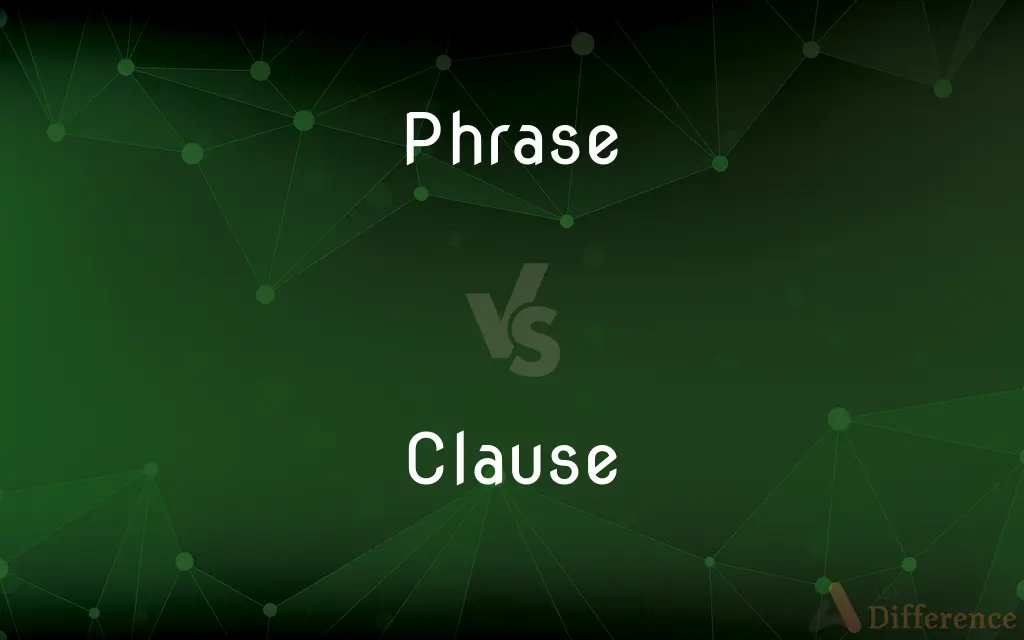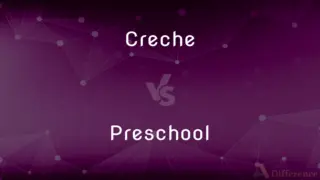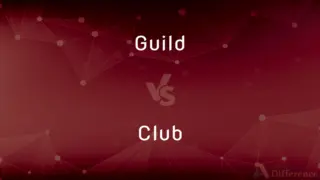Phrase vs. Clause — What's the Difference?
By Tayyaba Rehman — Updated on September 20, 2023
A phrase is a group of words that function together but don't contain both a subject and a verb. A clause is a group of words that includes both a subject and a verb, and can stand alone as a sentence if it's independent.

Difference Between Phrase and Clause
Table of Contents
ADVERTISEMENT
Key Differences
A phrase is a collection of words that may have nouns or verbals but lacks a subject-verb pair. Phrases serve various functions in a sentence but don't have the depth to express a complete thought. A clause, conversely, contains a subject and a predicate (verb), allowing it to convey a complete thought if it is an independent clause.
Phrases can act as nouns, adjectives, or adverbs but they don't possess the grammatical structure to be a sentence. Clauses, on the other hand, can sometimes stand alone as sentences if they are independent, or they can be dependent and therefore need to be attached to an independent clause.
In a phrase, the lack of a subject-verb pair limits its grammatical function. For example, phrases can be part of a clause. A clause, however, due to its subject-verb combination, can exist as a simple sentence, or it can be a part of a complex or compound sentence.
Phrases are often used for stylistic and functional aspects in both prose and poetry. They can add detail, context, or emotion to the main subject. Clauses are the building blocks of sentences; they provide the necessary structure to convey complete thoughts and ideas.
Comparison Chart
Subject-Verb Pair
Lacks
Contains
ADVERTISEMENT
Completeness
Can't stand alone
Can if independent
Function
Adds detail/context
Forms sentences
Types
Noun, Adjective, etc
Independent, Dependent
Flexibility
Limited
More flexible
Compare with Definitions
Phrase
A sequence of words commonly used together.
Break a leg is an idiomatic phrase.
Clause
A component of a sentence capable of expressing a complete thought.
If it rains is a dependent clause needing completion.
Phrase
A component of a sentence that can function as a single part of speech.
Reading a book is a phrase acting as a noun.
Clause
A part of a sentence that includes a subject-verb pair.
While she waits is a dependent clause.
Phrase
A string of words that convey meaning but not a complete thought.
With great power is a phrase that needs completion.
Clause
A building block of complex and compound sentences.
Because it rained, we stayed indoors has two clauses.
Phrase
In syntax and grammar, a phrase is a group of words which act together as a grammatical unit. For instance, the English expression "the very happy squirrel" is a noun phrase which contains the adjective phrase "very happy".
Clause
A grammatical unit that can stand alone if it's independent.
The cat meows is an independent clause.
Phrase
A sequence of words that have meaning, especially when forming part of a sentence.
Clause
A group of words with a subject and a predicate.
She dances is an independent clause.
Phrase
A characteristic way or mode of expression
An apt turn of phrase.
Clause
In language, a clause is a constituent that links a semantic predicand (expressed or not) and a semantic predicate. A typical clause consists of a subject and a syntactic predicate, the latter typically a verb phrase, a verb with any objects and other modifiers.
Phrase
A brief, apt, and cogent expression
The phrase "out of the frying pan and into the fire.".
Clause
(Grammar) A group of words containing a subject and a predicate and forming part of a compound or complex sentence.
Phrase
(Music) A short passage or segment, often consisting of four measures or forming part of a larger unit.
Clause
A distinct article, stipulation, or provision in a document.
Phrase
A series of dance movements forming a unit in a choreographic pattern.
Clause
(grammar) A verb, its necessary grammatical arguments, and any adjuncts affecting them.
Phrase
To express orally or in writing
The speaker phrased several opinions.
Clause
(grammar) A verb along with its subject and their modifiers. If a clause provides a complete thought on its own, then it is an independent (superordinate) clause; otherwise, it is (subordinate) dependent.
Phrase
To divide (a passage) into phrases.
Clause
(legal) A separate part of a contract, a will or another legal document.
Phrase
To combine (notes) in a phrase.
Clause
To amend (a bill of lading or similar document).
Phrase
To make or express phrases.
Clause
A separate portion of a written paper, paragraph, or sentence; an article, stipulation, or proviso, in a legal document.
The usual attestation clause to a will.
Phrase
(Music) To perform a passage with the correct phrasing.
Clause
A subordinate portion or a subdivision of a sentence containing a subject and its predicate.
Phrase
A short written or spoken expression.
Clause
See Letters clause or Letters close, under Letter.
Phrase
(grammar) A word or, more commonly, a group of words that functions as a single unit in the syntax of a sentence, usually consisting of a head, or central word, and elaborating words.
Clause
(grammar) an expression including a subject and predicate but not constituting a complete sentence
Phrase
(music) A small section of music in a larger piece.
Clause
A separate section of a legal document (as a statute or contract or will)
Phrase
(archaic) A mode or form of speech; diction; expression.
Phrase
(dance) A short individual motion forming part of a choreographed dance.
Phrase
(transitive) To express (an action, thought or idea) by means of particular words.
I wasn't sure how to phrase my condolences without sounding patronising.
Phrase
To perform a passage with the correct phrasing.
Phrase
To divide into melodic phrases.
Phrase
A brief expression, sometimes a single word, but usually two or more words forming an expression by themselves, or being a portion of a sentence; as, an adverbial phrase.
"Convey" the wise it call. "Steal!" foh! a fico for the phrase.
Phrase
A short, pithy expression; especially, one which is often employed; a peculiar or idiomatic turn of speech; as, to err is human.
Phrase
A mode or form of speech; the manner or style in which any one expreses himself; diction; expression.
Thou speak'stIn better phrase and matter than thou didst.
Phrase
A short clause or portion of a period.
Phrase
To express in words, or in peculiar words; to call; to style.
Phrase
To use proper or fine phrases.
Phrase
An expression forming a grammatical constituent of a sentence but not containing a finite verb
Phrase
A short musical passage
Phrase
An expression whose meanings cannot be inferred from the meanings of the words that make it up
Phrase
Put into words or an expression;
He formulated his concerns to the board of trustees
Phrase
A group of words that lack a subject and verb.
Under the weather is a phrase used to describe feeling sick.
Phrase
A set of words that adds context or detail to a sentence.
In the nick of time is a phrase that adds urgency.
Common Curiosities
Can a Clause stand alone?
An independent clause can stand alone as a sentence.
What is a Clause?
A clause is a group of words that contains a subject and a verb.
Can a Phrase stand alone as a sentence?
A phrase cannot stand alone as a sentence because it doesn't express a complete thought.
How do you identify a Clause?
A clause is identified by the presence of a subject and a predicate.
What is a Phrase?
A phrase is a group of words that function together but lack a subject and a verb.
Are there different types of Phrases?
Yes, phrases can be noun phrases, verb phrases, adjectival phrases, etc.
What is the role of a Phrase in a sentence?
A phrase can act as a noun, an adjective, or an adverb to provide detail or context.
Do Clauses contain verbs?
Yes, clauses contain a subject-verb pair.
Are there different types of Clauses?
Yes, clauses can be independent or dependent.
Do Phrases contain verbs?
Phrases may contain verbals but not a subject-verb pair.
Can a Phrase become a Clause?
A phrase can become a clause if a subject and a verb are added.
What is the role of a Clause in a sentence?
A clause can form the core of a sentence or add additional information.
How do you identify a Phrase?
A phrase is identified as a group of words lacking a subject and verb but still serving a function.
Is understanding Phrases and Clauses important for language mastery?
Yes, understanding phrases and clauses is crucial for mastering grammar and sentence construction.
Can a sentence have multiple Phrases and Clauses?
Yes, a sentence can contain multiple phrases and clauses for complexity.
Share Your Discovery

Previous Comparison
Creche vs. Preschool
Next Comparison
Guild vs. ClubAuthor Spotlight
Written by
Tayyaba RehmanTayyaba Rehman is a distinguished writer, currently serving as a primary contributor to askdifference.com. As a researcher in semantics and etymology, Tayyaba's passion for the complexity of languages and their distinctions has found a perfect home on the platform. Tayyaba delves into the intricacies of language, distinguishing between commonly confused words and phrases, thereby providing clarity for readers worldwide.
















































